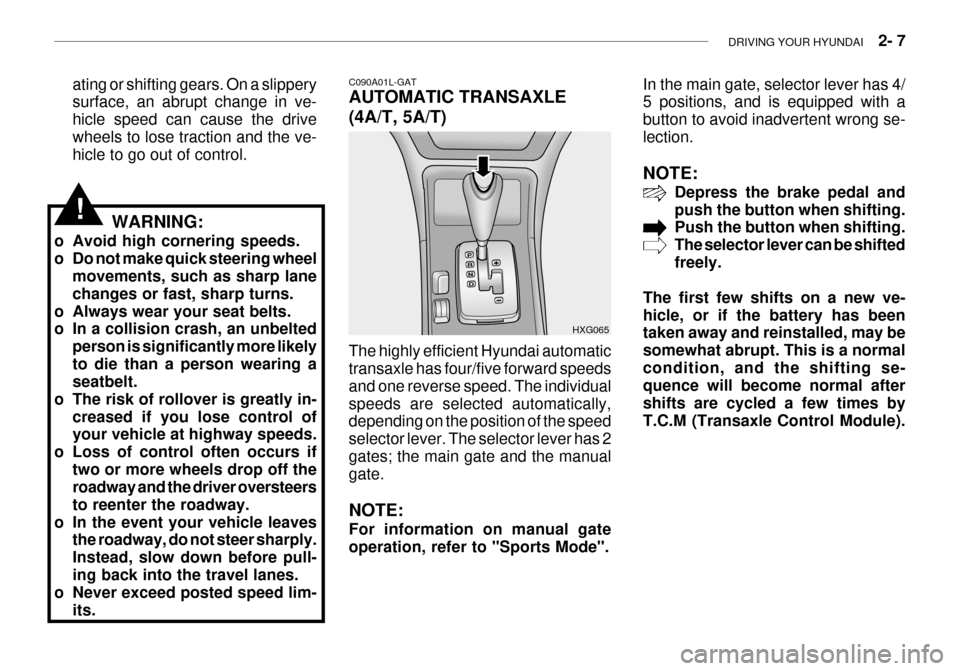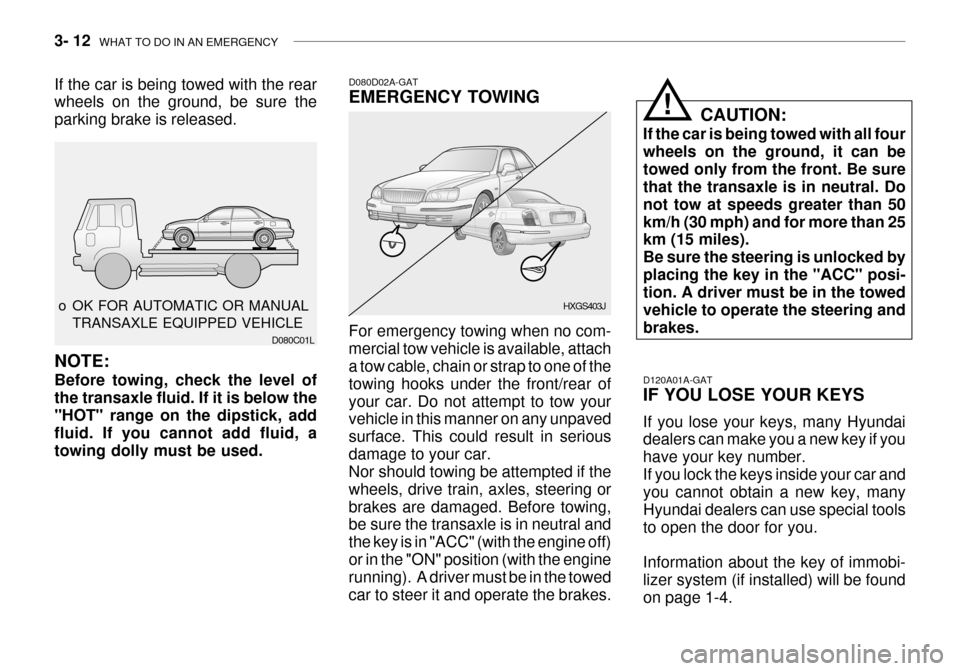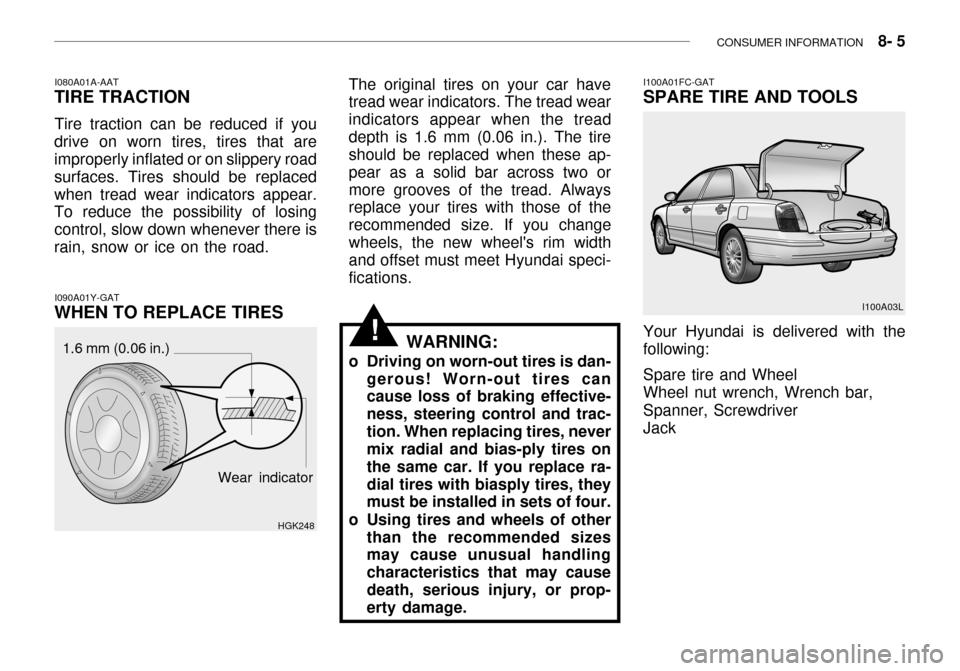four wheel drive Hyundai Grandeur 2003 Owner's Manual
[x] Cancel search | Manufacturer: HYUNDAI, Model Year: 2003, Model line: Grandeur, Model: Hyundai Grandeur 2003Pages: 235, PDF Size: 14.25 MB
Page 139 of 235

DRIVING YOUR HYUNDAI 2- 7
C090A01L-GAT AUTOMATIC TRANSAXLE (4A/T, 5A/T)
HXG065In the main gate, selector lever has 4/ 5 positions, and is equipped with a button to avoid inadvertent wrong se-lection. NOTE:
Depress the brake pedal and push the button when shifting. Push the button when shifting. The selector lever can be shiftedfreely.
The first few shifts on a new ve-hicle, or if the battery has been taken away and reinstalled, may be somewhat abrupt. This is a normalcondition, and the shifting se- quence will become normal after shifts are cycled a few times byT.C.M (Transaxle Control Module).ating or shifting gears. On a slippery surface, an abrupt change in ve- hicle speed can cause the drivewheels to lose traction and the ve- hicle to go out of control.
The highly efficient Hyundai automatictransaxle has four/five forward speeds and one reverse speed. The individualspeeds are selected automatically, depending on the position of the speed selector lever. The selector lever has 2gates; the main gate and the manual gate. NOTE: For information on manual gate operation, refer to "Sports Mode".
!WARNING:
o Avoid high cornering speeds.
o Do not make quick steering wheel movements, such as sharp lanechanges or fast, sharp turns.
o Always wear your seat belts.
o In a collision crash, an unbelted person is significantly more likely to die than a person wearing a seatbelt.
o The risk of rollover is greatly in-
creased if you lose control ofyour vehicle at highway speeds.
o Loss of control often occurs if
two or more wheels drop off theroadway and the driver oversteers to reenter the roadway.
o In the event your vehicle leaves the roadway, do not steer sharply.Instead, slow down before pull-ing back into the travel lanes.
o Never exceed posted speed lim-
its.
Page 166 of 235

3- 12 WHAT TO DO IN AN EMERGENCY
If the car is being towed with the rear wheels on the ground, be sure the parking brake is released.
o OK FOR AUTOMATIC OR MANUAL TRANSAXLE EQUIPPED VEHICLE D080C01LD080D02A-GAT EMERGENCY TOWING For emergency towing when no com- mercial tow vehicle is available, attach a tow cable, chain or strap to one of the towing hooks under the front/rear ofyour car. Do not attempt to tow your vehicle in this manner on any unpaved surface. This could result in seriousdamage to your car. Nor should towing be attempted if the wheels, drive train, axles, steering orbrakes are damaged. Before towing, be sure the transaxle is in neutral and the key is in "ACC" (with the engine off)or in the "ON" position (with the engine running). A driver must be in the towed car to steer it and operate the brakes. HXGS403J
CAUTION:
If the car is being towed with all fourwheels on the ground, it can betowed only from the front. Be sure that the transaxle is in neutral. Do not tow at speeds greater than 50km/h (30 mph) and for more than 25 km (15 miles). Be sure the steering is unlocked byplacing the key in the "ACC" posi- tion. A driver must be in the towed vehicle to operate the steering andbrakes. D120A01A-GAT IF YOU LOSE YOUR KEYS If you lose your keys, many Hyundai dealers can make you a new key if you have your key number.If you lock the keys inside your car and you cannot obtain a new key, many Hyundai dealers can use special toolsto open the door for you. Information about the key of immobi- lizer system (if installed) will be found on page 1-4.
!
NOTE: Before towing, check the level of the transaxle fluid. If it is below the"HOT" range on the dipstick, add fluid. If you cannot add fluid, a towing dolly must be used.
Page 222 of 235

CONSUMER INFORMATION 8- 3
CAUTION:
Always observe the following:
o Check pressures when the tires are cold. That is, after the car has been parked for at least threehours and hasn't been driven more than 1.6 km or one mile since starting up.
o Check the pressure of your spare tire each time you check thepressure of other tires.
o Never overload your car. Be es- pecially careful about overload-ing if you equip your car with a luggage rack or car top carrier. I040A01S-GAT SNOW TIRES If you equip your car with snow tires, they should be the same size and have the same load capacity as the original tires. Snow tires should beinstalled on all four wheels; other- wise, poor handling may result. Snow tires should carry 28 kPa (4 psi) more air pressure than the pres- sure recommended for the standard tires on the tire label on the driver'sdoor edge, or up to the maximum pressure shown on the tire sidewall whichever is less.Do not drive faster than 120 km/h (75mph) when your car is equipped withsnow tires.
6.0x15 6.0x16
TIRE SIZE
RIM
SIZE PRESSURE, kPa (PSI)
205/65R15 94V205/60R16 96V REAR
210(30) 210(30) FRONT
240(35) 240(35)
NORMAL LOAD MAXIMUM LOAD
REAR
240(35)240(35)
FRONT
220(32)230(33)
These pressures were chosen to pro-
vide the most satisfactory combina-tion of ride comfort, tire wear and stability under normal conditions. Tire pressures should be checked at least monthly. Proper tire inflation pressures should be maintained for these reasons:
o Lower-than-recommended tire pressures cause uneven tread wear and poor handling.
o Higher-than-recommended tire pressures increase the chance ofdamage from impacts and causeuneven tread wear.
!
Page 224 of 235

CONSUMER INFORMATION 8- 5
I100A01FC-GAT SPARE TIRE AND TOOLS Your Hyundai is delivered with the following: Spare tire and Wheel Wheel nut wrench, Wrench bar, Spanner, Screwdriver Jack I100A03L
The original tires on your car have tread wear indicators. The tread wear indicators appear when the treaddepth is 1.6 mm (0.06 in.). The tire should be replaced when these ap- pear as a solid bar across two ormore grooves of the tread. Always replace your tires with those of the recommended size. If you changewheels, the new wheel's rim width and offset must meet Hyundai speci- fications.
!
I080A01A-AAT
TIRE TRACTION
Tire traction can be reduced if you
drive on worn tires, tires that are improperly inflated or on slippery road surfaces. Tires should be replacedwhen tread wear indicators appear. To reduce the possibility of losing control, slow down whenever there israin, snow or ice on the road.
I090A01Y-GAT
WHEN TO REPLACE TIRES
Wear indicator
1.6 mm (0.06 in.)
HGK248WARNING:
o Driving on worn-out tires is dan- gerous! Worn-out tires can cause loss of braking effective- ness, steering control and trac-tion. When replacing tires, never mix radial and bias-ply tires on the same car. If you replace ra-dial tires with biasply tires, they must be installed in sets of four.
o Using tires and wheels of other than the recommended sizesmay cause unusual handling characteristics that may causedeath, serious injury, or prop- erty damage.